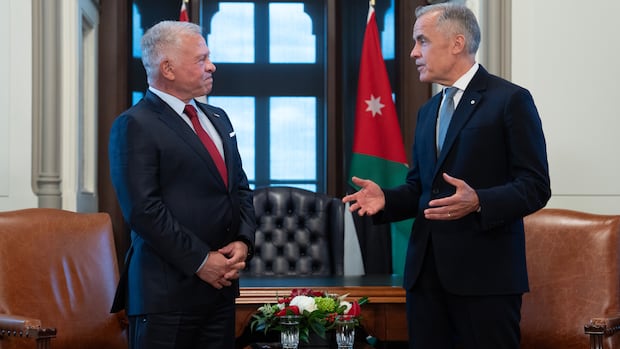The water's not safe to drink in much of war-torn Sudan. But people have no choice
Published: 2025-08-15 13:04:22 | Views: 8
As It Happens2 1/2 years of civil war fuels cholera crisis in Sudan
Two weeks ago, a human body was removed from a well in a refugee camp in Sudan, according to Doctors Without Borders. Two days later, people were drinking the water again.
It's a distressing illustration of the situation Sudan's residents are facing after nearly 2 ½ years of civil war, says Sylvain Penicaud, a project co-ordinator with the global aid organization.
Crowded camps, heavy rain and a lack of hygiene supplies have fostered the perfect storm for cholera, a painful and deadly water-borne disease, to spread.
"Displaced persons are extremely exposed to those kinds of health problems created by unsafe water," Penicaud told As It Happens guest host Aarti Pole. "People have no choice but get water [in] such horrific conditions."
Hundreds of thousands flee besieged city
Sudan has been at war since April 2023, when fighting broke out in the capital city of Khartoum between the Sudanese army and paramilitary Rapid Support Forces.
Since then, the violence has spread to other parts of the country, killing more than 50,000 people, displacing 12.5 million, and pushing many to the brink of famine, according to the United Nations.
These intersecting crises are all on display in Tawila, a small town in the North Darfur state, where Penicaud is working with Doctors Without Borders to provide health care to hundreds of thousands of internally displaced people.
Roughly 300,000 people have come to Tawila since the start of the conflict, increasing the town's population tenfold.
"I think most people cannot imagine what it is to have almost half a million people at the same place in an extreme level of vulnerability, lacking basically everything," Penicaud said.
Most people taking refuge there, he says, are women and children who fled the state's besieged capital city of el-Fasher, a hot spot in the conflict.
"They fled from fights with almost nothing in their pockets, just a few supplies, some clothes [and] cooking materials, but that's it, pretty much," Penicaud said.
The United Nations Security Council on Wednesday reiterated its call for the RSF to lift its siege of el-Fasher, while denouncing the group's plan to resume its offensive in the city and establish a rival government in the areas of Sudan it controls.
The UN World Food Program is calling for access to el-Fasher to deliver aid to people facing starvation.
"As a coping mechanism, some residents of the area are reportedly surviving on animal fodder and food waste," spokesman Stéphane Dujarric said.
Canada also joined 29 other countries in calling on RSF to end the siege, and for both sides to agree to a humanitarian pause and guarantee the "safe passage of civilians to leave areas of active hostilities on a voluntary basis, in the direction they choose."
"This cannot continue," reads the statement, signed by Randeep Sarai, Canada's secretary of state for international development.
Cholera vaccine campaign rolls out
Meanwhile, Sudanese health officials are launching a 10-day vaccination campaign for cholera in Khartoum.
Resident Montaser al-Sayed said he and his family recently returned home after being displaced by fighting. They feared cholera in the chaotic conditions but said the vaccination campaign reassured them.
"As a mother, I was relieved," said another resident, Razaz Abdullah.

Several cholera vaccine campaigns have rolled out across Sudan since the outbreak was declared last year. But it's proven nearly impossible to keep the disease under control as the war continues.
The bacterial infection spreads through contaminated food and drinking water, causing diarrhea, dehydration — and if left untreated, death.
Doctors Without Borders estimates there have been 99,700 cases of Cholera in Sudan and more than 2,470 related deaths since July 2024.
In the Darfur region alone, the aid group has treated more than 2,300 cholera patients and recorded 40 deaths in the past week at facilities run by the Ministry of Health.
Penicaud says people in the camps simply don't have enough clean water to meet their needs.
The rainy season, he says, makes things worse as floods contaminate water supplies and damage sewage systems.
Meanwhile, the fighting, a lack of financial donations and muddy, dangerous roads all make it hard to get supplies to those who need them.
"The situation is extremely urgent, but also the constraints in terms of supplies are huge," Penicaud said. "It's very difficult for us and other humanitarian organizations to scale up our operations and to provide assistance to such a huge number of displaced persons."
He's calling on international donors to step up.
Doctors Without Borders estimates it will need $100 million US to enact an adequate response plan in Tawila alone. But in July, Penicaud says, the organization raised just five per cent of that.
"We know that there's a lot of discussion with different donors to increase the level of the response," he said, "but it's really urgent to scale up operations here in Tawila."
Source link





